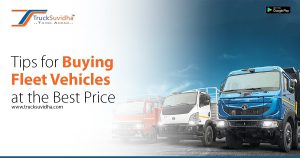Tips for Buying Fleet Vehicles at the Best Price
The globe is more connected than ever thanks to rapid urbanisation and technical advancements. Fleet vehicles definitely come in second place to the internet as the driver of this change. The fleet industry has expanded exponentially and is also anticipated to expand much more quickly in the future years in order to meet the rising demands of eCommerce.
The largest portion of a fleet’s funding typically goes towards its fleet vehicles. You won’t have time to sort through all the hype associated with car shopping if you’re a fleet owner or manager about to engage in some fleet purchasing. Whether you’re looking to purchase large delivery vehicles, pickup trucks, or service vans, you’ll want to get the best vehicle at the best price, and you probably won’t have time to spend hours sorting through all the sales literature.
What exactly is a fleet vehicle?
Vehicles used by businesses and organizations to provide services or for personal use refer to as fleet vehicles. These vehicles can perform a wide range of services and tasks, from transportation to product delivery. Freight, transportation, and moving companies are the most common examples of such businesses.
Service vans, e-bikes, fire trucks, ambulances, pickup trucks, public transportation, freight trucks, the list goes on and on.
Here are the five most important factors to consider when selecting fleet vehicles:
- Utilisation and operation
Whether you’re buying, financing, or leasing your fleet vehicles, make sure they’re suitable for their intended purpose. This includes conducting route research.
With so many petrol, diesel, hybrid, and electric vehicles on the market, it’s more important than ever to determine whether the vehicle will get used for long motorway commutes, urban stop-start driving, or other specialisms such as off-road work.
This is where vehicle type and fuel consumption come into play. If a driver drives 25,000 miles per year, an electric car’s range is inadequate. A small, economical van would not be up to the task of driving around construction sites carrying heavy loads. Similarly, an off-road 4×4 that makes frequent long road trips would be expensive to operate in terms of fuel consumption.

- Cost
Cost is important. It underpins everything, not just the initial purchase price. Investigate tax burdens, funding costs, leasing costs, maintenance and fuel costs, as well as residual values. You may be leasing and believe that used values are unimportant. They certainly do. Vehicles with low residual values are usually so for a reason. It’s up to you to figure out what their weakness is, because it could cost you a lot of money in the long run.
As a result, it’s best to consider the total cost of ownership. Understand every cost you will incur, and your long list will quickly become a shortlist.
- Establish criteria
Are the vehicles you’ve chosen a good representation of your company? You can ensure that your chosen vehicles reflect your business objectives, branding, and image, as well as providing employees with the right vehicle for the job, by standardising specifications and having a clear idea of what you want from the start.
You can be consistent in maintenance, training, and parts by having standardised specifications for vehicle types and roles.
- Be safe
While reducing accidents makes your fleet safer, it also saves you money in the form of lower insurance premiums and less vehicle downtime. As a result, it is worthwhile to consider vehicle technologies that improve safety and reduce the likelihood of accidents. A cost-benefit analysis of those solutions can help you make better decisions.
Furthermore, better accident management may get associated with a faster return on investment and lower costs.
- Upkeep and repair
Maintenance can be an expensive aspect of vehicle ownership, so do your homework on projected costs for a vehicle’s routine service needs, parts, and labour. Check the warranty coverage to ensure that it will cover projected repair costs as well.
When it comes to reporting on vehicle performance, maintenance, and costs to help influence future decisions, fleet maintenance software can be invaluable.
Conclusion
Getting a good deal on fleet vehicles doesn’t have to take all day. Working with dealers and sales reps who understand how to make the vehicle-buying process more convenient for businesses will help you get the best price with the least amount of hassle.
Read more at- www.trucksuvidha.com




Recent Comments